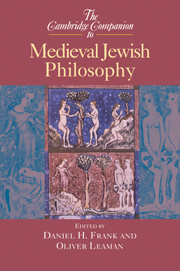Book contents
- Frontmatter
- PART I BACKGROUND AND CONTEXT
- PART II IDEAS, WORKS, AND WRITERS
- PART III THE LATER YEARS
- 15 The impact of Scholasticism upon Jewish philosophy in the fourteenth and fifteenth centuries
- 16 Jewish philosophy and the Jewish-Christian philosophical dialogue in fifteenth-century Spain
- 17 Hasdai Crescas and anti-Aristotelianism
- 18 The end and aftereffects of medieval Jewish philosophy
- Guide to further reading in English
- Index
18 - The end and aftereffects of medieval Jewish philosophy
from PART III - THE LATER YEARS
Published online by Cambridge University Press: 28 May 2006
- Frontmatter
- PART I BACKGROUND AND CONTEXT
- PART II IDEAS, WORKS, AND WRITERS
- PART III THE LATER YEARS
- 15 The impact of Scholasticism upon Jewish philosophy in the fourteenth and fifteenth centuries
- 16 Jewish philosophy and the Jewish-Christian philosophical dialogue in fifteenth-century Spain
- 17 Hasdai Crescas and anti-Aristotelianism
- 18 The end and aftereffects of medieval Jewish philosophy
- Guide to further reading in English
- Index
Summary
INTRODUCTION
Although the main center of the development and maturation of Jewish philosophy came to an end with the expulsion of the Jews from Spain, Jewish philosophy did not disappear. The exiled Sephardic Jews who were interested in philosophy took with them their philosophical libraries and continued their philosophical pursuits in their new domiciles. Some of these transplanted Spanish émigrés continued to do philosophy in the ways they knew and were used to; some, however, absorbed in various degrees the philosophical environment of their new abodes, which were considerably different from the philosophical culture in which they were educated. This was most notable in Italy, where some of the more prominent Sephardic exiles settled. After all, Italy was the home of the Renaissance, during which philosophy, as well as the arts and literature, underwent some significant transformations.
The very existence of a distinctive Renaissance philosophy has sometimes been questioned, and consequently a distinctive Renaissance Jewish philosophy has been challenged. There is no question that medieval Aristotelianism, in its various forms, continued unabated throughout the fifteenth–seventeenth centuries, especially in the universities. And it found its adherents and advocates amongst Jewish philosophical thinkers, as we shall see. But there is no doubt that the philosophical climate in fifteenth-century Italy was changing and that new or different philosophical books were being read and made part of the philosophical culture of the period.
- Type
- Chapter
- Information
- The Cambridge Companion to Medieval Jewish Philosophy , pp. 414 - 445Publisher: Cambridge University PressPrint publication year: 2003



